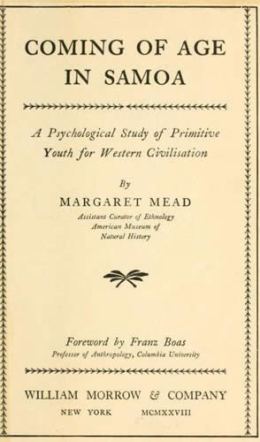
“Are the disturbances which vex our adolescents due to the nature of adolescence itself or to the civilization?” That was the question anthropologist Margaret Mead sought to answer when she studied a group of Samoan women, ranging from 9 to 20 years old, in 1925. Her findings, published three years later in Coming of Age in Samoa, argued that Samoa’s more homogenous and sexually progressive culture afforded an easier transition for its young women, compared with the “series of groups advocating different and mutually exclusive standards” in the U.S. Mead’s findings set off a nature vs. nurture debate that continues to this day. Though several critics accused Mead of unfounded and incorrect research, the book remains a staple in the study of anthropology, and Mead one of the field’s most respected pioneers.
